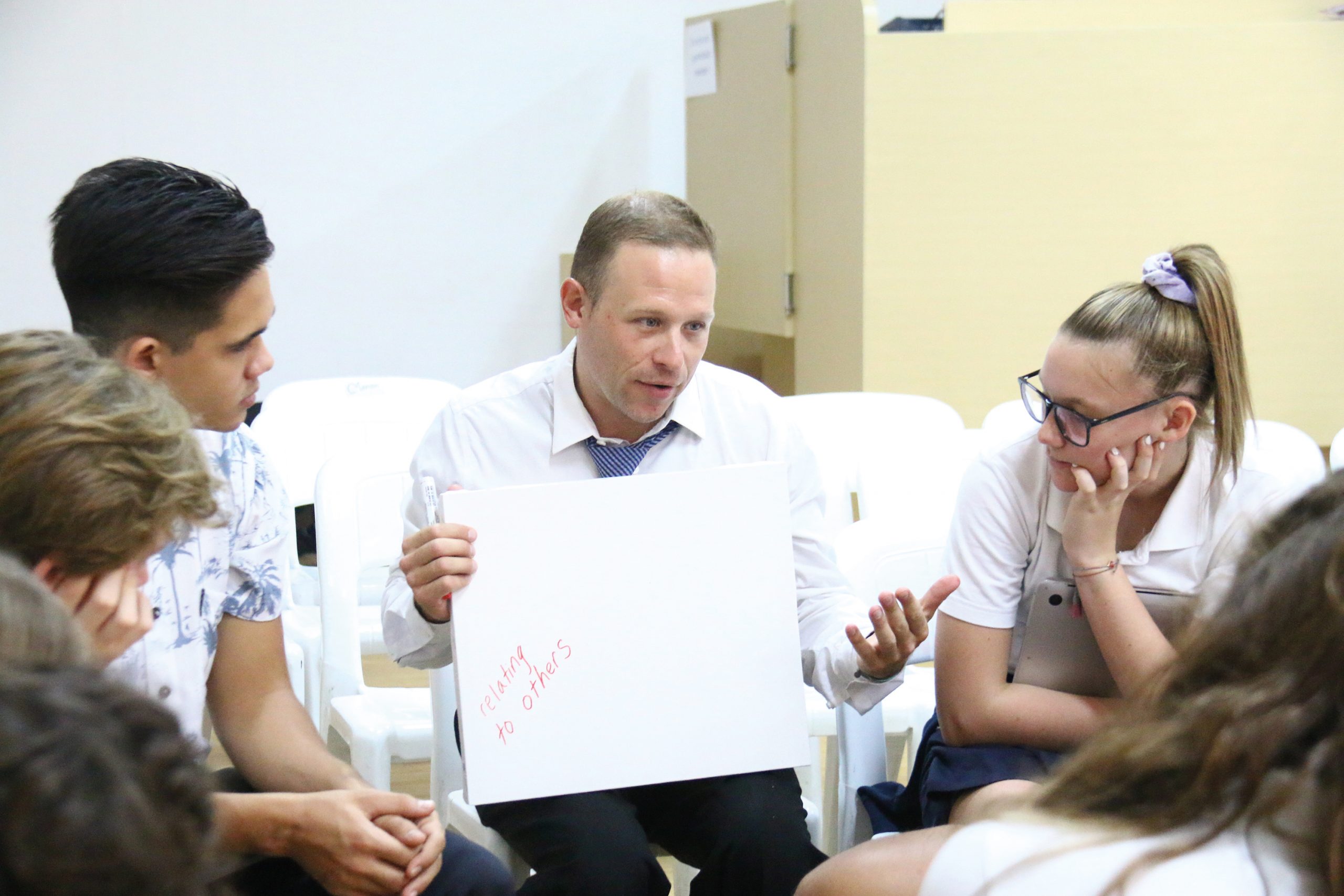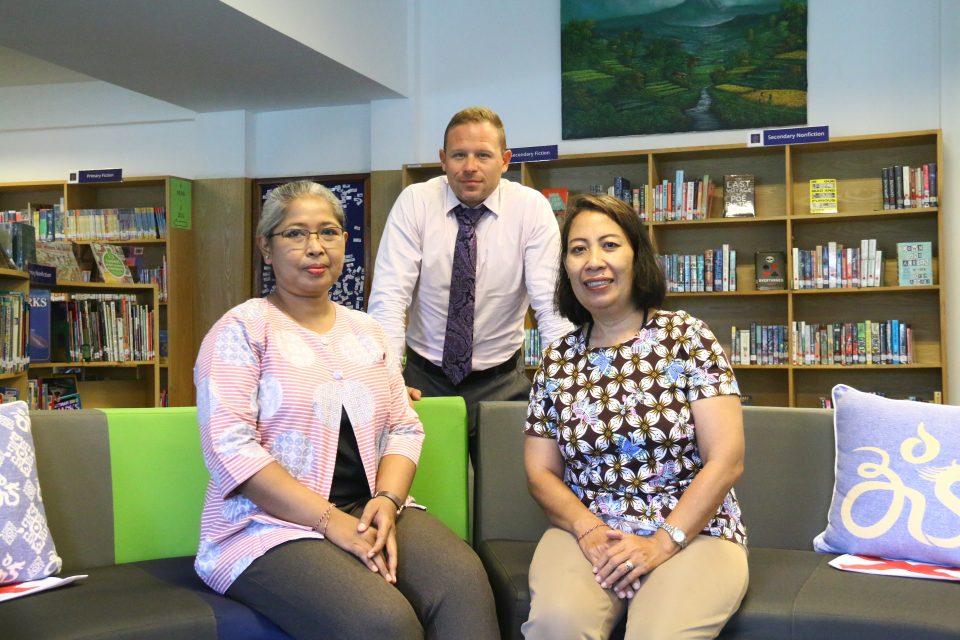For some, a library could be someone’s cocoon to dismiss the outside world. But when was the last time you stepped into a library?
NoahJon Marshall is currently the Head Librarian at Bali Island School (BIS), alongside two Indonesian library staff members. Noah has been a librarian for nine years, living around the US, Saudi Arabia and now Bali.
Originally from the Schenectady/Saratoga area of upstate New York, USA, Noah revealed librarians trained in and who want to work in the US need to have a Master’s degree and take additional education credits to be certified to work in schools.
“When I finally earned mine in summer 2012, the American public-sector economy was still in bad shape from the 2008 ‘Great Recession’ and public funding was still at low levels. The job prospects of full time, salaried-employment there weren’t good,” explained Noah.
An American school mostly for working expatriate children in Jeddah, Saudi Arabia contacted him after seeing his resume online. His grandparents had actually lived there briefly in the 1970s when his grandfather was a consultant with Saudia Airlines. It just seemed to be a weird but timely mix of interesting factors – plus an urgency to start working. Noah eventually accepted the job; he was willing to go to extremes to avoid sustained unemployment.
Then, in 2016, after five years in Saudi Arabia, the Head of School at BIS at the time reached out via an international teaching or employment website called Search Associates. “I had some interest from schools in Italy and Bulgaria as well but ultimately, I took the job here because a teaching colleague of mine had told me if I didn’t accept an offer to work in Bali, he would never speak to me again, since Bali is his favourite place in the world,” he said.
Many aspects go into a “good” library. To Noah, the most important is knowing who the users are. Beautiful buildings, top of the line technology, and hundreds of shelves of the most important books alone will not create a “good” library if no one utilises it.
“You need to be able to offer people what they want and need. Reflecting their culture, interests, and backgrounds are essential, as well as being able to meet their academic needs,”
explained Noah. A school and community should see themselves reflected in its library.
Noah describes BIS’ library as well-resourced considering the size of the school. The school’s library had a healthy, generous budget before COVID-19 hit, resulting in approximately 26,000 books in the physical library space, with another 14,000 or so throughout the campus via individual classroom book collections. About 1,300 new books a year are added to the library. The digital age has brought a pretty strong collection of digital resources and databases to the library, as well.
“We can offer good service in large part to our two Indonesian staff members, Ibu Agung and Ibu Kadek. They handle a lot of the daily logistics stuff that ensures a smooth-running program. Agung has multiple library certifications and licenses – a real library professional. Kadek has come to us more recently and has also become an important part of the running operations,” said Noah.
Hours and hours are spent in a library to do assignments, to research on topics, or to simply kill time reading favourite books. After all, a library should be comfortable enough to stay and focus. BIS’ library has a large common area space, an outdoor terrace, a classroom dedicated to instruction, and a “quiet study” room. “I think we have established a comfortable, inviting, inclusive atmosphere for all our users. We pride ourselves in extending extra effort to accommodate our users’ needs and surprising people with the 21st-century approach to librarianship while learning that people sometimes don’t generally associate with libraries,” said Noah.
Noah believes being a librarian is a misunderstood profession, but a lot of that can be blamed on librarians themselves. “Some fail to advocate for themselves and their institutions, likewise, some don’t necessarily like to be outgoing and engage their patron base. That said, some dynamic ones are doing incredibly creative things,” explained Noah.
He enjoys the flexibility, freedom and creativity the job allows. It is kind of a mix of multiple jobs. Being a librarian is distinctly different than a teacher. Serving the library’s users is the most important and fulfilling aspect, and librarians have the resources and authority to work with their users in incredibly unique ways.
“Librarians have something to offer everyone,” said Noah. Many types of librarians are involved in many different industries and projects, from archives to hospitals to museums to schools. As to common misconceptions from his profession, Noah’s heard that he’s apparently allowed to read all day and that the services of libraries have been replaced by internet search engines. “I understand why these falsehoods are perpetuated, but I also can easily point to reasons why both are untrue,” he said.
This doesn’t necessarily mean having a huge collection of resources. A library’s staff’s effort and enthusiasm for doing everything within their power to fulfil the needs of the people who walk through those doors are vital. It’s a form of public relations, too. People can still be served at a high level of effort, creativity, and accommodations. The staff also try and solve problems, even if the questions aren’t answered perfectly.
David Lankes, an Information Science professor at the University of South Carolina, wrote, “The mission of libraries is to improve society through facilitating knowledge creation in their communities” in his book, “The Atlas of New Librarianship”. This favourite quote of Noah explains libraries should be less physical-only spaces, and more like incubators for learning and the creation of new understandings. This cuts across all subjects, cultures, and demographics.
“When we offer services, classes, or reading recommendations, the question most etched in our mind is; are we making new knowledge possible? Are people able to walk out of here a better version of themselves because of the access and learning environment we’ve created here? We, along with all of the staff at BIS, work hard to ensure the answer is always yes,” said Noah.
Noah describes Bali’s overall reading scene as lacking a coordinated public library system and its innumerable benefits that come along with a few Taman Bacaans and small local libraries. However, the Ubud Writers and Readers Festival is a real gem. He attended the 2019 conference. “I read two or three books I loved just from being exposed to the authors at the event,” he said. Besides worldwide names coming to the island to share their experiences and work, Indonesia has an amazing collection of talented authors that deserve serious attention.
“After the basic human needs of nourishment, shelter, and relationships, reading is probably next. Reading as well as the ability to find, discern, and build understandings and connections from any sort of stimulus or information is one of the foundations of education and of growing as a person,” said Noah.
Knowing everything and finding something new to learn about are possible with reading. All of the world’s problems that have been solved, essential inventions, and milestones in the modern era involved reading and thinking. “It moves us forward,” he said. Everything that exists can be understood in some form simply by reading about it.
Besides, reading brings increased knowledge, awareness of history and current events, improved vocabulary, the ability to better participate in social conversations, understanding, and discovering interests and preferences, etc.
Noah understands the problem of people falling off the reading bandwagon. Someone might be used to read a lot growing up, but nowadays, excessive struggles and excuses to pick up a book arise more than they’d like. Considering easy information can be accessed via digital devices and the avalanches of information being published every day, it is now effortless to access information but it has also never been harder, simply because of the potential for overload and overstimulation.
“I believe everyone, regardless of their reading history, can find something to read that’ll grab their attention and drive them to learn more. It takes finding the right topic at the right time and then being paired with the right resource in the right way; it can be celebrity gossip, quantum physics, or the history of cooking,” he explained. Plenty of reading opportunities include articles, transcripts, blogs, news, or Tweets. “Librarians should be meeting people’s needs and trying to spark that interest that someone can then run with themselves.”
Noah sometimes asks reluctant readers about their goals or what they want their future to look like. Depending on the answers, he can usually make a credible argument on how reading can help them get there.
Annual sales of ebooks were up 20 percent at the end of 2020, compared to roughly the same period in 2019 in the US. Highly influenced by the pandemic, Americans are buying more and still reading. Ebooks account for anywhere from 10-20 percent of all books sales. In total, all book sales in the US increased about 8 percent from 2019.
Data from 2018 shows that paper books still account for 80-85 percent of all book sales worldwide. Almost 700 million books were sold in 2017 and almost 750 million in 2020. More books are being published nowadays, including the absolute explosion of comics and graphic novels in the past 15 years.
Digital devices have played a big part in rewiring text consumption. “I think it’s a combination of the instant gratification we get from digital inputs and social media notifications, the increasing reliance on devices, our busy and overwhelming lives, and the pace at which new information and news come streaming at us,” said Noah.
Noah teaches library classes at BIS. Students ages 3 up to Grade 5 come in for weekly lessons in information literacy, literature, searching digital resources, examining the quality of those resources, critical thinking, technology, reading comprehension, researching, history, current events, sociology, writing, and even gaming. Noah doesn’t have regularly scheduled classes with students in Grade 6-12. However, he assists them and their classroom teachers with research, projects, and college essays.
BIS’ library aims to be the leading library for literature, resources, research, information, media and critical literacy skill acquisition, and the realisation of intellectual pursuits for professional and personal needs in Bali for members of the BIS community. “Likewise, to support the creation of knowledge, the enjoyment of literature, and the instilment of critical literacy skills to further the successes of and for those people, whatever it is they want to pursue,” Noah concluded.
Also Read Bali Island School & IB World School




